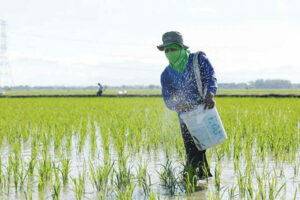Climate change risks threaten Asia’s progress on sustainable development goals

RISKS stemming from climate change are preventing Asia and the Pacific countries from making progress on sustainable development goals (SDGs), according to a joint report by multilateral agencies and institutions.
“The impacts of climate change threaten to increase hunger and poverty and are contributing to a reversal of sustainable development gains achieved by countries in the Asia-Pacific region over recent decades,” the Economic and Social Commission for Asia and the Pacific (ESCAP), United Nations Development Programme (UNDP) and Asian Development Bank (ADB) said.
According to the “People and Planet: Addressing the Interlinked Challenges of Climate Change, Poverty and Hunger in Asia and the Pacific” joint report, the majority of climate-related human displacement occurs within the region.
From 2010 to 2021, there were around 213.5 million displacements in Asia and the Pacific due to extreme climate-related events.
“The largest displacements were observed in China, the Philippines, India, Pakistan, and Bangladesh,” the report said.
The impact of climate change is hindering countries’ ability to advance SDGs on poverty and hunger, it added.
“Further gains are still needed, but they are hampered by multiple crises, including the lingering impacts of the COVID-19 (coronavirus disease 2019) pandemic and the increasing effects of climate change,” the report said.
An earlier report by ESCAP showed that the Asia and the Pacific region is not expected to meet any of the 17 SDGs before the 2030 deadline, with an anticipated delay of 32 years.
Latest ESCAP data showed that the Philippines has made progress in 83 indicators, stagnant in 28, and regressed in 43. Meanwhile, there were insufficient data for the remaining 94 indicators.
According to the joint report, climate impacts are also “unevenly” distributed as poorer countries are more exposed to shocks and are unable to adapt quickly.
“Though poor and vulnerable people in the region have contributed the least to emissions, they are affected the most by climate change and are the least prepared to cope and adapt.”
Current policies on addressing poverty and hunger have not integrated climate priorities, it noted.
“Transformative change is needed. Integrated approaches that unlock synergies and mitigate trade-offs in managing the ecosystem provide the best opportunities for transformative change that can advance climate action and address poverty and hunger,” it added.
For example, it said that emissions commitments and national adaptation plans should be integrated with social protection, disaster risk reduction, climate adaptation, and sustainable agriculture strategies.
Under sustainable agriculture, the report recommended techniques such as laser land leveling. This uses a laser beam to level farmland as well as mitigate seed and water losses.
“Field trials in Cambodia, the Philippines, Thailand, Viet Nam and India show that laser land leveling can boost the efficiency of land use by 3-6% and improve the efficiency of irrigation and fertilizer by 12-40% and 10-13% respectively.”
It also suggested water management techniques such as alternate wetting and drying.
“It has been tested by farmers in Bangladesh, Indonesia, Lao People’s Democratic Republic, Myanmar, the Philippines and Viet Nam and achieved water savings of 15-25% with no drop in yields,” it added.
The report also highlighted the need to develop climate-resilient social protection systems and ensure these build adaptive capacity.
“The Philippines has been making rapid progress in broadening social protection systems since 2009,” it said, citing the Pantawid Pamilyang Pilipino Program.
It also noted the need to promote employment in nature-based sectors, developing institutional capacity for climate risk assessment and governance, and utilizing regional cooperation, among other initiatives.
“Governments in the region (must) take steps to better integrate nexus approaches in climate policies, sustainable development strategies and climate actions,” it added. — Luisa Maria Jacinta C. Jocson




